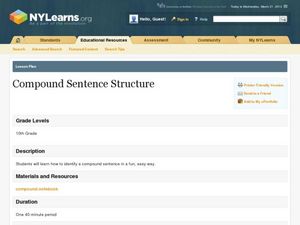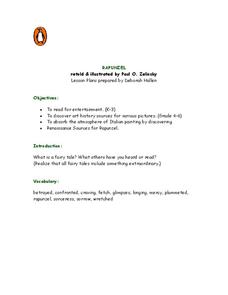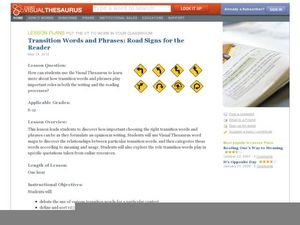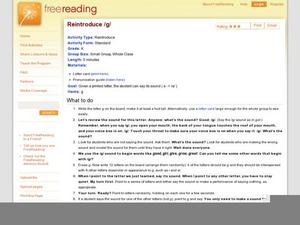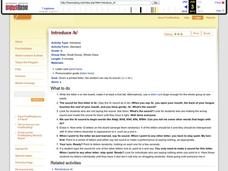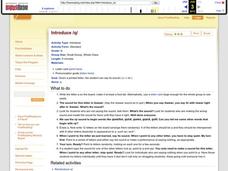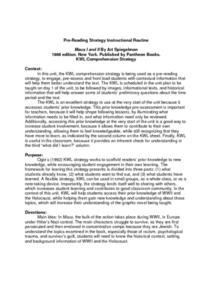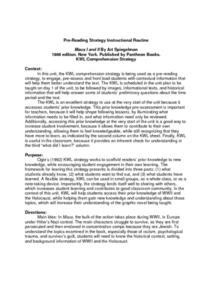Curated OER
In The Words of Abraham Lincoln...
Students explore the words of Abraham Lincoln. In this Abraham Lincoln lesson, students analyze segments of "The Gettysburg Address," his annual address to Congress in 1862, and his letter to Mrs. Bixby. Students conduct further research...
Curated OER
Compound Sentence Structure
SMART boards a great way to create interest in any subject - even grammar! Using the provided SMART board instructional activity, have your 10th graders come up to the board and combine two independent clauses using a "glue" word...
Curated OER
Preparing Students to Read the Aeneid
Teaching the Aeneid this year? Read this quick article to develop some plans and strategies for teaching the epic poem to your advanced learners.
Curated OER
Rapunzel
Youngsters read the story of Rapunzel and go over vocabulary and answer discussion questions. They also list qualities of characters, discuss settings, make a diorama, and more.
Curated OER
Introduce Vocabulary: I Hate To Be Sick
Engaged in a read aloud, kids use the story to define new vocabulary words, raising their hands when they hear new words in the story. Additionally, individuals refer to the text to show how the word was used in context....
Curated OER
Transition Words and Phrases: Road Signs for the Reader
Therefore! However! Furthermore! Explore the power of transition words and phrases. Signal your readers by suggesting the relationship between different thoughts or points. Help them demonstrate an understanding of word relationships.
Curated OER
Marketing to Teens: Gotta Have It! Designer & Brand Names
Advertisers want us to believe we would be accepted if we wore the right clothes or owned the right stuff. This assumption forms the heart of an exploration of the impact of advertising on teenagers. A safe classroom environment would...
Curated OER
Vocabulary: Multiple Meaning Words in Context
Learners use context clues to define words with multiple meanings. After extensive practice with their teacher, learners read through six sentences, they then identify a word with a multiple meaning, and determine its meaning based on...
Curated OER
Introduce Onset-Rime Blending
Mico (or your favorite puppet) helps emergent readers recognize words from segmented phonemes. Explain to learners that he struggles with pronouncing words and needs their help. Model how Mico segments sounds in single-syllable words....
Curated OER
Introduce /t/
What sound does the letter t make? As scholars develop letter recognition, form sound associations with strategies like these. Explain the tongue movement in making the /t/ sound, asking learners to try it. Draw the t on the...
Curated OER
Reintroduce g
Synthesize pronunciation, recognition, letter sound, and word examples as scholars learn all there is about the letter g. They examine the letter shape and listen to you pronounce the hard /g/ sound. As you explain how this sound is...
Curated OER
Introduce Soft-C
Do your emerging readers know that letters sometimes borrow the sounds of other letters? Explore the soft /c/ sound, explaining that c has borrowed the sound from s. After giving scholars some examples of words that begin...
Curated OER
Introduce /k/
Explore the ins and outs of the letter k using these strategies combining pronunciation, letter recognition, and initial phoneme examples. Scholars examine the letter shape and listen to you pronounce the /k/ sound. Use these tips to...
Curated OER
Reintroduce /c/
Do you c what I c? Use these strategies combining pronunciation, letter recognition, and initial phoneme examples to examine the letter c with kindergartners. Scholars examine the letter shape and listen to you pronounce the soft...
Curated OER
Introduce /Q/
Everything your pre-readers need to know about the letter Q is right here; this strategy combines pronunciation, letter recognition, sound, and word examples. Scholars examine the letter shape and listen to you pronounce the /kwww/...
Curated OER
Build Mastery: Making Inferences
Do your youngsters realize that they are constantly making inferences? Expose this inner process by bringing out the book they will be reading. Ask scholars what they think the plan is, and explain that their answers are the product of...
Curated OER
The Writing Process
Introduce young writers to the writing process. Activities model the steps in the writing process (prewriting, drafting, revising, editing, polishing). A logic tree template is also included.
Curated OER
Knowledge Rating Scale Vocabulary Activity #2 Bud, Not Buddy
As your kids read chapters nine through eleven, present them with this vocabulary chart. Nine vocabulary words are shown, and pupils must decide if they know it well, have heard it, or have no clue what it means. Consider re-creating...
Curated OER
Gary Paulsen's Canyons: Vocabulary Activity
The final chapters of Canyons (chapters 17-24) present readers with more challenging vocabulary. Two activities provide readers with an opportunity to figure out what they know, and then to use what they know to complete a word search...
Curated OER
The Catcher in the Rye: Anticipation Guide
"Mistakes are necessary; therefore, we shouldn't shelter children from the world." Class members agree, somewhat agree, somewhat disagree, or disagree with a series of statements related to concepts explored in The Catcher in the Rye....
Curated OER
Maus I and II: KWL Pre-Reading Comprehension Strategy
Prior to reading Maus I and II, class members fill in a KWL chart to determine what they want to learn and how to find information about World War II and the Holocaust. Consider gathering packets of information and research sites before...
Curated OER
KWL Comprehension Strategy: Maus I and II
How much does your class know about World War II? Before reading Art Spiegelman's Maus I, lead your class in creating a KWL chart. Knowing the background and setting of the novel are extremely important in understanding this survivor's...
Curated OER
Ordinary People: Guided Imagery
After reading chapter six of Ordinary People with your class, conduct this activity with your class. Turn the lights down, put on your softest voice, and have them try to imagine that they lost a close friend. Then, encourage them to...
Curated OER
Romeo and Juliet & Shakespearean Theater
The Bard? Folly? Tragedy? How familiar are your pupils with terms associated with Romeo and Juliet? Class members rate their knowledge of a list of words and then share what they know with the class. The worksheet, discussion questions,...



